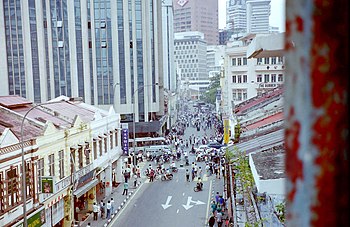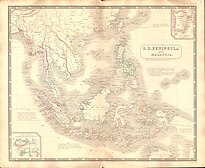Movement started in 1998 by Anwar Ibrahim
Reformasi Street protests in Kuala Lumpur after Anwar Ibrahim's sentencing, April 1999.
Date September 1998 – late-2000s Location Caused by
Goals
Methods
Resulted in
Several hundred thousands
Reformasi is a political movement in Malaysia . It was initiated in September 1998 by Anwar Ibrahim , former Deputy Prime Minister of Malaysia , after he was sacked from his position by Malaysia's then-Prime Minister , Mahathir Mohamad . The movement, which began while the country hosted the Commonwealth Games , initially demanded the resignation of Malaysia's then-Prime Minister , Mahathir Mohamad , and for the end of the Barisan Nasional -led (BN) government. It later became a reformist movement demanding social equality and social justice in Malaysia. The movement consisted of civil disobedience , demonstrations , sit-ins , rioting , occupations and online activism .[ 1]
Building on the momentum of Reformasi, Wan Azizah Wan Ismail , Anwar's wife, formed and led the Social Justice Movement (Malay : Pergerakan Keadilan Sosial , known by its abbreviations, ADIL) in late-1998.[ 2] Ikatan Masyarakat Islam Malaysia (IKATAN), a minor Islamic political party based in Terengganu , leading to the formation of Parti Keadilan Nasional (PKN) in 1999.[ 3] Democratic Action Party (DAP), Parti Rakyat Malaysia (PRM) and Malaysian Islamic Party (PAS), Barisan Alternatif (BA) was formed on 24 October 1999, and contested in the 1999 and 2004 Malaysian general election .
In 2003, PKN and PRM merged and became the Parti Keadilan Rakyat (PKR). PKR was instrumental in the creation of Pakatan Rakyat (PR), which scored electoral successes in the general elections of 2008 and 2013 , and later as Pakatan Harapan (PH) in the 2018 Malaysian general election , which saw BN losing its parliamentary majority for the first time since 1955 . Despite electoral successes in recent decades, the Reformasi movement, as recent as 2018, is still seen as an ongoing political movement in the country.

